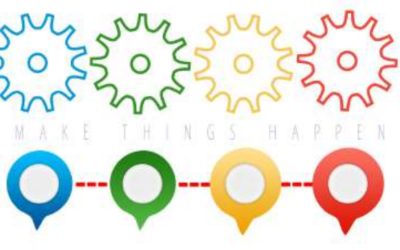Many students and adults attribute difficulties in math to memory problems, but probing these difficulties further often leads to the realization that it’s not a simple matter of remembering or forgetting, but rather trouble defining, organizing, then retrieving what has been learned. PROBLEMS DEFINING AND UNDERSTANDING ‘WHY’ First of all, if a student is struggling with remembering new information, it’s best to check and see if the definitions, procedures, and the why of procedures are clear. In fact, it may be a flipside of a strength in long-term memory that contributes to dyslexic students’ confusion with ambiguous terms. A good example of this James Tanton’s blog post: When fractions are introduced as pieces of pie, 3/5 + 1/5 makes sense to equal 4/5, but what […]
Organizing Math [Premium]
Math is a challenge for almost every student as the world recovers from disruptions due to the pandemic. Although almost all community colleges waive some math requirements, only a few colleges completely waive them. One list I found was here, but do check individual college sites for current information. 1. University of Arizona – Substitution allowed 2. University of the Ozarks – Substitution for College Algebra 3. California Polytechnic State University – Substitution for non-math majors 4. Cal State Fullerton – Math substitution 5. Cal State Long Beach – Math substitution 6. Cal State San Bernadino – Math substitution 7. Menlo College – Math substitution 8. Santa Monica College – Math substitution 9. Sierra College – Math waiver 10. UC Berkley – Math waiver 11. […]
Math Games for All [Premium]
Math games are a great way to build a hands-on sense for number flexibility and quantity. The best situation is if hands-on and visual math activities are started from the beginning, but the good news is that it’s never too late to start. Even students who are taught almost exclusively in rote/symbolic ways can benefit by activities and reinforcements at home or in out-of-class tutoring sessions. SUBITIZING AND NUMBER SENSE Subitizing is a term that refers to a rapid and confident judgment about a small number of items. If you have three coins in your hand or five do you quickly know how many coins there are without having to count? That number sense is important before progressing to higher calculations. Click on the photos […]
New Ways to Hack Learning [Premium]
Almost every structured literacy program uses letter tiles and flashcards. The reason for this is that there are so many word parts and whole words to learn and the use of tiles and cards can give students visual support as they focus on various letters, letter groups, and their sounds while building up reading fluency. Some students may have difficulty learning with tiles and cards if the lessons or demonstrations proceed too quickly, or if working memory is easily overloaded or motor challenges make hands-on activities more difficult than less kinesthetic ones. Activities like word sorts may also provide a little physical activity that help students stay alert and engaged whereas more passive study may have them drifting off. For college kids and adults, flashcards […]
Dyslexia and Math: Knowing Why [Premium]
It’s been estimated that almost half of dyslexic individuals will also be dyscalculic (Wilson et al., 2014), but dyscalculia is less likely to be assessed or formally identified in school, leaving students to flounder on their own. WHY IS DYSLEXIA COMMONLY ASSOCIATED WITH MATH LD? Experts still debate why there is such significant overlap, but at least one recent study found that spatial difficulties were especially associated with students with dyscalculia or those with both dyslexia and dyscalculia. Besides spatial factors, difficulties in sequencing, trouble with symbols, working memory overload, and rote math fact retrieval are all difficulties commonly seen among dyslexic students and those with dyscalculia. What is not particularly common among dyslexic students is difficulty with math reasoning – in fact for […]
The Language of Math [Premium]
“The meanings of words in general usage are often very different from their mathematical meanings.” — Marilyn Burns Educational leaders are becoming increasingly aware of the importance of teaching the language of math in order to raise understanding and performance. There can be extensive reading and writing demands associated with math learning and dyslexic students may be at particular disadvantages learning because they may have trouble reading word problems, dual tasking (listening while taking notes), and confusion with symbols. A paper by Riccomini and colleagues recalled some of the difficulties associated with learning the language of math: – Words that have different meanings in contexts (a foot = 12 inches vs. foot of the bed) – Homonyms (pie vs. pi) – Concepts that may be […]
Managing Too Much Information in Math with Card Sorts and Categories [Premium]
Too often math classes start off with a lot of math problem-solving that can result in students in getting lost. Sometimes the problem is that math explanations overload working memory; other times, students struggle because they can’t listen for understanding at the same time they are trying to take notes, leaving them to figure out what was being taught in math after they get home. THE SEA OF MATH PROBLEMS Often students may find themselves in a sea of math problems. They may have followed the reasoning when concepts were first introduced, but quickly find themselves drowning in dozens and dozens of problems that confuse them in terms of the different ways they are solved. CARD SORTS FOR MATH EXAMPLES AND NEW VOCABULARY […]
How to Not Go Crazy from Fractions and Decimals [Premium]
Fractions and decimals can drive a lot of us crazy. After learning “big” or “long numbers” are larger, suddenly fractions and decimals come along to flip these assumptions upside-down. For dyslexic students, care must be taken at the first step of understanding the equivalences among the different representations of fractions and decimals before moving onto calculations. WHY STUDENTS MAY STRUGGLE WITH FRACTIONS AND DECIMALS Creative Maths has a nice summary of why decimals are so difficult. An excerpt: “Without zero, 2001 and 201 and 21 would all look the same! From early on we recognize that longer numbers represent larger quantities. We know that a salary with lots of zeroes is better than one with only a few. $1000000 is more than $200 even […]
Mind Mapping Math
Fractions can be confusing. Some students are confused by the new terminology that comes with fractions (numerator, denominator), while others are confused because they seem to have different principles from those learned from whole numbers. Numbers that "get bigger"...
Working through Higher Math [Premium]
“An algebra equation should have a physical meaning to it, and have good real world examples…” — Gary McGregor, PhD Gary McGregor has a lot to say when it comes to math because he survived dropping out of high school, knowing only the basics of math calculation (adding and subtracting, but not fractions) before he enrolled in Junior College determined to learn all the math he would need to become a mechanical engineer. Not only did he succeed in that goal, but he also became an expert higher mathematician and now publishes papers involving complex math. So how did he get from A to Z? MATH FROM MULTIPLE PERSPECTIVES Gary was fortunate to learn from a math teacher in junior college who […]
Math Strategies Instead of Drill [Premium]
In the many years Brock and I spent testing and listening to dyslexic students at every level of education, we often heard first hand accounts of how they learned how to tackle difficult subjects and bypass school-related challenges. As research studies bear out (for instance, see Kirby’s study of dyslexic university students), many dyslexic students in higher education have arrived at where they are because they are deep learners, savvy about how they learn best, and strategic in how they approach school. Brain-Based Reasons Why Math Strategies Are Better for Dyslexics Than Drill But there is also neurobiological evidence that supports why strategies may be a superior route for dyslexic learning compared to drill or simple repetition. By now, anyone who knows about brain […]
Math Distance Learning for Students with Dyslexia
Here are several desirable features for remote math programs for dyslexic students: - Comprehensive (math builds on prior knowledge; programs must be comprehensive) - Spiralling (reviews and deepens knowledge of concepts over time; more info here) - Video and...

![Memory Problems and Math [Premium]](https://www.dyslexicadvantage.org/wp-content/uploads/2023/02/Memory-Problems-and-Math-Premium-400x250.png)
![Organizing Math [Premium]](https://www.dyslexicadvantage.org/wp-content/uploads/2023/01/020-math-book-400x250.png)
![Math Games for All [Premium]](https://www.dyslexicadvantage.org/wp-content/uploads/2023/01/Math-Games-for-All-1.jpg)
![New Ways to Hack Learning [Premium]](https://www.dyslexicadvantage.org/wp-content/uploads/2023/01/New-Ways-to-Hack-Learning-Dyslexic-Advantage-1.png)
![Dyslexia and Math: Knowing Why [Premium]](https://www.dyslexicadvantage.org/wp-content/uploads/2022/12/Dyslexia-and-Math-Knowing-Why-Dyslexic-Advantage-C.jpg)
![The Language of Math [Premium]](https://www.dyslexicadvantage.org/wp-content/uploads/2022/10/The-Language-of-Math-Dyslexic-Advantage.jpg)
![Managing Too Much Information in Math with Card Sorts and Categories [Premium]](https://www.dyslexicadvantage.org/wp-content/uploads/2022/06/math-dyslexia-shutterstock.png)
![How to Not Go Crazy from Fractions and Decimals [Premium]](https://www.dyslexicadvantage.org/wp-content/uploads/2022/05/math-dyslexia-decimals-fractions-400x250.png)

![Working through Higher Math [Premium]](https://www.dyslexicadvantage.org/wp-content/uploads/2022/04/Working-through-Higher-Math-400x250.png)
![Math Strategies Instead of Drill [Premium]](https://www.dyslexicadvantage.org/wp-content/uploads/2022/03/Math-Strategies-Instead-of-Drill-DA-Premium-March-2022-2-e1648381776105-400x250.png)














